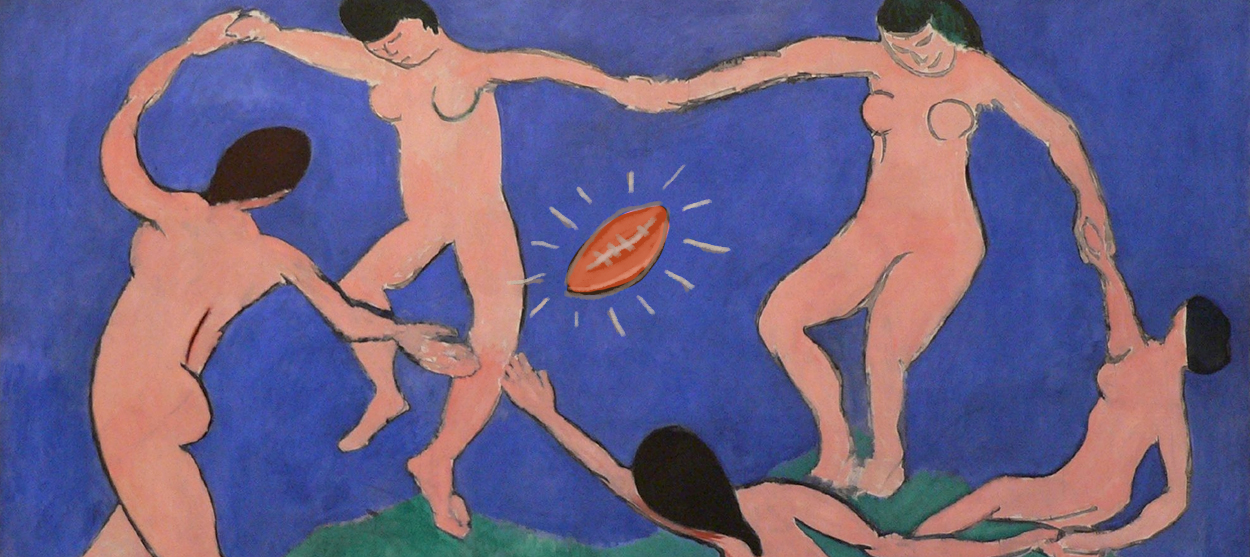How to enjoy football while being French
Meet the French fans of le football américain


A free daily email with the biggest news stories of the day – and the best features from TheWeek.com
You are now subscribed
Your newsletter sign-up was successful
Football, as both college football's bowl season and the NFL playoffs have recently reminded us, is probably the world's silliest sport. It's difficult to imagine any other force powerful enough to compel people to say things like "Ski-U-Mah," whatever that means, or any other force sufficient to animate Bills Mafia. It's also difficult to imagine any other force which might persuade people to stand outside for hours on some November Saturday or Sunday in a parking lot as they drink adult beverages of varying quality.
The whole thing is also very American, and as much as it is literally — recitations of words and phrases and pledges no one has heard since seventh grade civics, ludicrous flyovers, chants of "U-S-A! U-S-A!" after the ludicrous flyovers — the extent to which it is figuratively, spiritually American is far greater. The game itself, after all, is ours. They call it American football.
All this raises some questions: What would it look like if non-Americans liked football? What would it look like if the least American people in the world liked football? What would it look like if the French liked football?
The Week
Escape your echo chamber. Get the facts behind the news, plus analysis from multiple perspectives.

Sign up for The Week's Free Newsletters
From our morning news briefing to a weekly Good News Newsletter, get the best of The Week delivered directly to your inbox.
From our morning news briefing to a weekly Good News Newsletter, get the best of The Week delivered directly to your inbox.
One might conclude, through nothing but logic alone, that they would drink wine instead of beer and have cheese platters full of arcane delights, such as snails and impossible cheeses, instead of our wide array of snack foods. Perhaps they too would have chants of venerable antiquity which they would ritually shout at the television. In other words, it sounds like paradise.
While it does seem strange, football — sorry, American football — no, sorry, I'm wrong again, it's le football américain — is in fact enjoyed and practiced by people who speak various forms of French. Ed Orgeron, the head coach of the national champion LSU Tigers and a man who chugs Red Bull and makes all his utterances in the rumble of an earthquake, speaks in Cajun French to the media on occasion and no doubt uses it on occasion when recruiting in the bayou where he grew up. And if a man who coached a team with a legitimate claim to be the best of all time can speak French, then French cannot possibly be a hindrance to the spirit of football.
This year even the Super Bowl, like college football’s national championship, will feature some French influence: Laurent Duvernay-Tardif, a guard for the Kansas City Chiefs, is a native French-speaker who was born and grew up in Quebec. And if anyone in Paris itself wants to watch the game, they can make their way to any of several bars that will be showing the game. (That said, it seems very likely that most of these bars will be filled with American expats: Who but an American would head to a bar to watch a garish sports spectacle that starts at 12:30 a.m.?)
France itself has about 22,000 football players and a top-level football league, the Ligue Élite de Football Américain, which has eight teams. In a sign that this is real football, the same couple teams are consistently winning it all. Since 2010 the Thonon Black Panthers have appeared in five championship games and won three of them; in the preceding decade the La Courneve Flash won five. Many of the players have obligations besides the game — jobs, school — but they play anyway. It hearkens back, almost, to how football was played in America before the money started to really roll in and the whole thing was washed away and replaced with something else.
A free daily email with the biggest news stories of the day – and the best features from TheWeek.com
So the French-speakers of the world can enjoy football. But what does their fandom look like? What does it look like when they talk about it?
I've never encountered a football fan speaking French myself, but I have perceived faint glimmers of what it might be like in the Twitter account @thebluepennant. The bio of this account describes it as #1 sur le football américain NCAA en français, which is a series of words I, despite being an American, am able to translate. While tweets are a poor substitute for fandom expressed in real life, the account serves to answer several questions about what it might look like.
For one thing, what do you call teams? Do you translate their names? The answer, apparently, is no:
Here we also see excitement over a French player, and their joy in this victory for college football and France is about as heartwarming as it gets. Wilfried Pene, we salute you.
It is also revealed here that many of the most important words in the sport — yards, touchdown, the names of positions — are preserved untranslated into French. I prefer to think that this happens because the words themselves, and the syllables and sounds that constitute them, contain some divine power imbued by the football gods, and in the absence of that power it is simply impossible to discuss football at all. A more prosaic explanation, namely, that almost every fan of college football learned about the game in English and therefore uses the English words to describe the fundamentals of the game, seems more likely to be correct but also extremely boring. And this is football, after all: insane mythmaking must be both permitted and encouraged.
So I applaud the Blue Pennant as I applaud Duvernay-Tardif and Pene and the guys playing in the Ligue Élite de Football Américain. I think I can speak for all football-loving Americans and say that we are happy to share the game with them.
I have just one question: How, exactly, do you pronounce Notre Dame?
Want more essential commentary and analysis like this delivered straight to your inbox? Sign up for The Week's "Today's best articles" newsletter here.
Steve Larkin is a writer from the state of Maine. His writing has appeared in The Week, the Catholic Herald, and other publications.
-
 The ‘ravenous’ demand for Cornish minerals
The ‘ravenous’ demand for Cornish mineralsUnder the Radar Growing need for critical minerals to power tech has intensified ‘appetite’ for lithium, which could be a ‘huge boon’ for local economy
-
 Why are election experts taking Trump’s midterm threats seriously?
Why are election experts taking Trump’s midterm threats seriously?IN THE SPOTLIGHT As the president muses about polling place deployments and a centralized electoral system aimed at one-party control, lawmakers are taking this administration at its word
-
 ‘Restaurateurs have become millionaires’
‘Restaurateurs have become millionaires’Instant Opinion Opinion, comment and editorials of the day
-
 Epstein files topple law CEO, roil UK government
Epstein files topple law CEO, roil UK governmentSpeed Read Peter Mandelson, Britain’s former ambassador to the US, is caught up in the scandal
-
 Iran and US prepare to meet after skirmishes
Iran and US prepare to meet after skirmishesSpeed Read The incident comes amid heightened tensions in the Middle East
-
 Israel retrieves final hostage’s body from Gaza
Israel retrieves final hostage’s body from GazaSpeed Read The 24-year-old police officer was killed during the initial Hamas attack
-
 China’s Xi targets top general in growing purge
China’s Xi targets top general in growing purgeSpeed Read Zhang Youxia is being investigated over ‘grave violations’ of the law
-
 Panama and Canada are negotiating over a crucial copper mine
Panama and Canada are negotiating over a crucial copper mineIn the Spotlight Panama is set to make a final decision on the mine this summer
-
 Why Greenland’s natural resources are nearly impossible to mine
Why Greenland’s natural resources are nearly impossible to mineThe Explainer The country’s natural landscape makes the task extremely difficult
-
 Iran cuts internet as protests escalate
Iran cuts internet as protests escalateSpeed Reada Government buildings across the country have been set on fire
-
 US nabs ‘shadow’ tanker claimed by Russia
US nabs ‘shadow’ tanker claimed by RussiaSpeed Read The ship was one of two vessels seized by the US military
